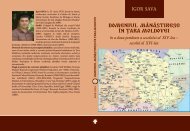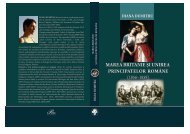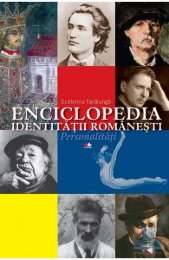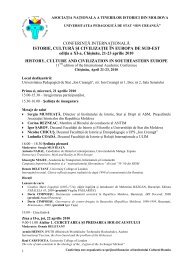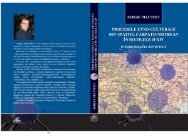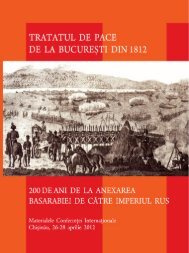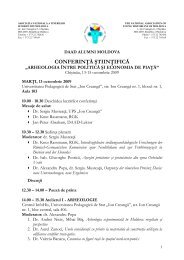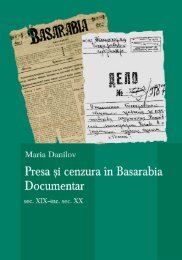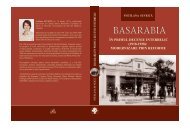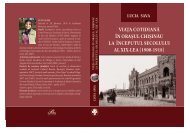Publicatie cu continut integral - Asociatia Tinerilor Istorici din Moldova
Publicatie cu continut integral - Asociatia Tinerilor Istorici din Moldova
Publicatie cu continut integral - Asociatia Tinerilor Istorici din Moldova
Create successful ePaper yourself
Turn your PDF publications into a flip-book with our unique Google optimized e-Paper software.
“modern” institutions were used by Latgalian intellectuals for transformation of local peasants without modern<br />
identity to modern nation with its own identity. Latvian Catholic clergy, mostly Latgalians themselves, began to<br />
play lea<strong>din</strong>g role in promoting of this national Latgalian development. Such narratives were popular among Latgalian<br />
intellectuals in exile but after restoration of Latvian Republic these ideas came back to Latvia.<br />
Language was widely used by Latgalian intellectuals in exile in their polemic with Latvian émigré activists. In<br />
1968 J. Lelis in the second Acta Latgalica volume wrote Latgalian can be recognized as dialect, but dialect with<br />
great features and developed literature tradition 1 . Other émigré intellectual V. Zeps proposed compromise viewpoint.<br />
In his book, devoted to Latgalian literature in exile, wrote, that “there is only one Latvian literature and one<br />
Latvian language, but there two languages of Latvians – the first one is based on Low-Latvian dialects, the second<br />
one – on Upper-Latvian dialects. The first language is Latvian and the second one is Latgalian” 2 .<br />
The next Latgalian revival started in Latvia. In March, 1991 local intellectuals from Balva, ludza, Kraslava<br />
and Daugavpīls declared necessity of organization of special institution for studies in Latgalian history, language<br />
and <strong>cu</strong>lture. Latgales Pētniecības institūts was established in 1991 and among its founders were local intellectuals<br />
who also proposed to continue publication in Latvia of famous diaspora yearbook Acta Latgalica. In the 1990s<br />
LPI organized some conferences, seminars, published some books in Latgalian problematic, inclu<strong>din</strong>g three volumes<br />
of Acta Latgalica. Nowdays Latgalian identity and concept of Latgale as lieux de memoire <strong>cu</strong>ltivates by<br />
intellectuals from Eastern Latvia. Local historians tried to develop lieux de memoire Latgalian image in general<br />
Latvian context.<br />
Actually modern Latgalian intellectuals proposed such perception of Latgale as lieux de memoire which is<br />
organically integrated, on one hand, to general Latvian identity project, and, on another hand, to historical studies<br />
in Latvia in general 3 . They proposed such images of Latgale which are freely understandable for local and<br />
for intellectuals from Riga. That is why in the center of their studies processes of national formation in Latgale.<br />
For example, Genovefa Barkovska analyzes in one of her works how intellectuals in Daugavpīls in the early 20th<br />
century developed Latgalian and Latvian identities when other identity projects were still actual 4 . Henrihs Soms<br />
is engaged in studies of German factor in Latgalian past. It is very interesting that he analyzes role of Gustaf<br />
Manteuffel in the categories of Latgalian historical narrative 5 . It is very important in general and national historiographical<br />
contexts, especially Polish, because intellectuals from Poland denied Latgalian identity of numerous<br />
local historical figures and understand them as representative of Polish historical tradition only. This aspect demonstrates<br />
that Latgalian intellectuals are engaged in search for their own national symbols and heroes, instead of<br />
common with neighbors.<br />
Probably concepts of modern Latgalian intellectuals became official and local intelligentsia determines vectors<br />
of development of Latgalian studies. In the same time history demonstrates other perception of Latgale as lieux de<br />
memoire, which evolutioned from national identity concepts to marginal projects.<br />
Polish tradition of history writing, like Latvian one, historically formatted and developed as nationalistic. Poles<br />
lived in different parts of three European Empires and they hadn’t their own Polish territorial district. tsarstvo<br />
Pol’skoe which formally existed in Russian Empire didn’t oc<strong>cu</strong>py all lands populated by Poles. They lived also in<br />
the territories of modern Ukraine, Belarus, Latvia and Lithuania. As for Latvia, majority of Poles on its territories<br />
lived in the Eastern Latvia. This region is famous in Polish tradition as inflanty Polskie. As for inflanty this word<br />
appeared in the Polish language under German influence and meant livland. Poland firstly got this region in 1667.<br />
Polish administration placed in Dźwinów or German Dünaburg.<br />
Polish historians developed concept accor<strong>din</strong>g which local pre-Polish aristocracy was assimilated and integrated<br />
in Polish szlachta. That is why family of Manteuffels which in Latgalian historiography glorified for its<br />
positive role in development of local Latvian identity, in Polish is understood as Polish dynasty. For example Polish<br />
intellectuals <strong>cu</strong>ltivated narrative about progressive role of Polish (and often they absolutize his Polishness, belongness<br />
to Polish <strong>cu</strong>lture) baron Gustaw Manteuffl in development of Latgalian <strong>cu</strong>lture. In the same time Polish<br />
1 LELIS, 1968.<br />
2 ZEPS, 1962, 1995.<br />
3 VALEINIS, 1999; KURSĪTE, 1999; ZEILE, 1999; BUDŽE, 1999.<br />
4 BARKOVSKA, 2003, 14 – 20.<br />
5 SOMS, 2003, 45 – 49.<br />
– 1 –



